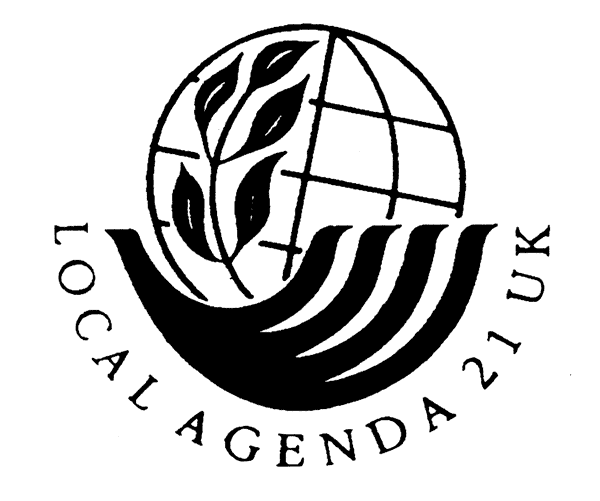
Local Agendas
Local Agenda 21 - part 1.
Anna Makismow has been involved in discussions on local Agenda 21 implementation with both Lewes Council in Sussex and Camden Council in north London. Now operating out of a squatted church in Kentish Town, she takes a look at how squatters, travellers and environmental protesters fit the Agenda perfectly.
Squall 9, Jan/Feb 1995, pg. 15.
Agenda 21 is based on the realisation that we cannot have a healthy society or economy in a world with so much poverty and environmental destruction, and acknowledges the need for major changes in attitude and lifestyles. It encourages individuals “to become an active part of the search for a sustainable future.” The attendant governments agreed in Rio that by 1996, every local authority should have developed a local Agenda 21.
While awareness and opposition to the Criminal Justice and Public Order Act grows, it is perhaps a good time to remind people that many of those who will be the first to be criminalised under this Act are already contributing to finding solutions to some of the global challenges which our head of state accepted at Rio.
Travellers and squatters have been branded by the Government as having nothing positive to offer but this is not the case. Agenda 21 identifies “unsustainable consumption” as one of the main causes of “the continued deterioration of the global environment.” Most travellers and squatters do not perceive material possessions in the same way as other sections of society, and perhaps the whole of society could learn a lesson from the simpler-way that they live.
The Agenda states that “to make urban life more sustainable, governments should see that the homeless, poor and unemployed get access to land, credit and low cost building materials. People also need security of tenure and legal protection against unfair eviction.”
Many of the one hundred thousand or so people who are squatting or travelling in this country would now be homeless, had they not adopted a ‘Do it yourself approach to their need for a home. Agenda 21 sees homelessness as a symptom of a “global environmental and development crisis”. Instead of putting criminal sanctions on squatting and practically outlawing the travelling lifestyle, the Government could fulfil some of its Agenda 21 commitments by supporting people who maintain a building that nobody else is using or who live in a truck or a bender.
By putting criminal sanctions on peaceful but direct protest, the Criminal Justice Act will outlaw one of the most effective ways of highlighting problems within society, non-violent direct action (NVDA). As the suffragettes in this country demonstrated, NVDA can act as force for positive change. A lot of NVDA in recent years has been focused around environmental issues eg. road schemes, nuclear power and the protection of wildlife. Those actions raise awareness of what is happening to our planet and possible solutions to environmental problems which, according to Agenda 21 should be everyone’s concern.
Anti-nuclear campaigners promote “ways of minimising and limiting the creation of radioactive wastes”, whilst road protesters “encourage forms of transportation that minimise emissions and harmful effects on the environment.” These are both stated aims of Agenda 21.
Protests increase public awareness of the choices we face as we move into the 21st century. They also allow ordinary citizens to bring their views and feelings into the political debate. The Government should accept these protests as prods in the right direction.
Free parties may not appear to be an environmental issue but a lot of young people go to them and young people are crucial to the success of Agenda 21. The government’s desire to suppress free parties along with squatting, travelling and eco-action has led to a blending of ideas, resources and information between these groups.
Information about environmental destruction and eco-action is appearing at parties and festivals, donations at free parties have helped to set up environmental community centres and housing projects and even a DIY urban farm in Luton, all in previously unused buildings. ‘Parties with a purpose’ have arrived and should be given space away from residential areas and encouraged.
Politicians and bureaucrats are struggling to implement Agenda 21 and are asking for all the world’s citizens to help, at a time when people on the fringes of our society are becoming more aware of the responsibilities we have in actively creating the world we want to live in. These people should be encouraged not criminalised. By suppressing diversity and dissent, the government is closing one path through which a sustainable future could be reached.
Through co-operation at all levels between government, local authorities and citizens, a sustainable 21st century can be achieved. We must work together for a brighter future.
Related Articles
What Is Agenda 21? - what is this buzzword sweeping through grassroots organisations? by Andy Johnson - Squall 9, Jan/Feb 1995
The Roots Of Sustainable Development - Local Agenda 21: doing it anyway. Andy Johnson investigates. Squall 10, Summer 1995.
Populating The International Promise - Will the Government act on its Agenda 21 commitments? By Jim Carey, Squall 10, Summer 1995.
